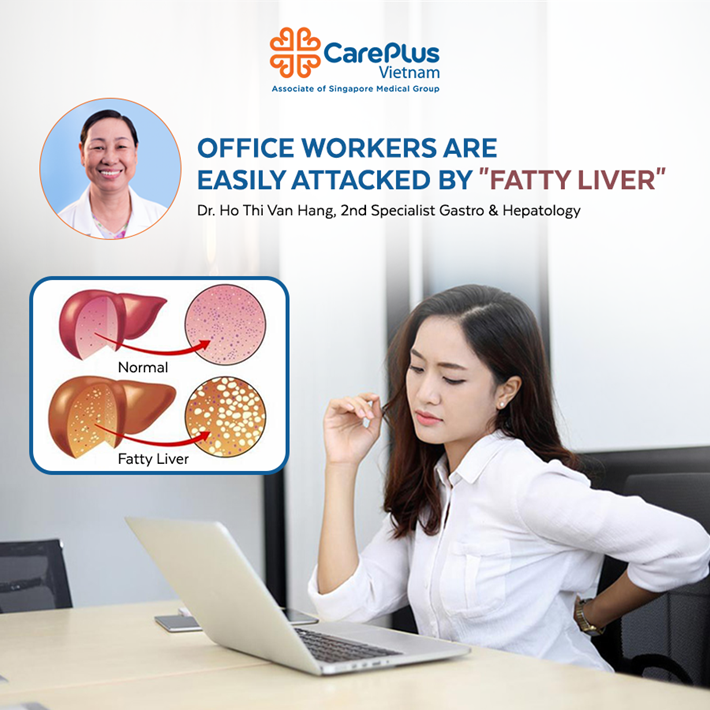OFFICE WORKERS ARE EASILY ATTACKED BY "FATTY LIVER"
Learn why office workers are prone to fatty liver disease and discover effective prevention tips. Understand the risks, symptoms, and necessary lifestyle changes to protect liver health in a sedentary office environment.

3/16/2022 10:36:43 AM
Office workers are at a high risk for developing fatty liver disease due to the nature of their jobs, which often involve sitting for long hours with less physical activity. This lifestyle can lead to the accumulation of excess fat in various parts of the body, including the liver.
1. What is fatty liver disease?
Fatty liver disease occurs when the amount of fat in liver cells exceeds 5% of the liver's weight.
In mild cases (grade I), fat accounts for about 5 to 10% of the liver's area. In grade II, fat constitutes more than 10% up to 25% of the liver's area. If it exceeds 25%, it is considered severe (grade III fatty liver disease).
Fatty liver disease can lead to serious complications such as hepatitis, cirrhosis, and even liver cancer.
2. Causes of fatty liver disease:
Several factors can cause fatty liver disease:
- Excessive alcohol consumption
- Overeating high-calorie foods and lack of physical activity
- Being overweight or obese
- Disorders of blood lipid metabolism
- Certain medications and chemicals
- Endocrine disorders: diabetes, hypothyroidism
- Malnutrition after gastric or intestinal surgery
3. Symptoms of fatty liver disease:
Fatty liver disease often presents nonspecific symptoms. However, affected individuals may experience the following:
- Pain in the upper right abdomen
- Fatigue
- Weight loss
- Weakness, exhaustion, loss of appetite, nausea, decreased libido
Severe symptoms indicating liver failure include:
- Jaundice
- Subcutaneous bleeding
- Leg swelling, Ascites
4. Treatment of fatty liver disease:
Currently, there is no specific medication for treating fatty liver disease. The best approach is regular check-ups for early detection and management, which can help restore liver health.
Diagnostic methods for early detection of fatty liver disease include:
- Liver enzyme tests, lipid profiles
- Abdominal ultrasound
- Liver biopsy
Additionally, patients should:
- Manage their diet to achieve and maintain a healthy weight
- Increase physical activity
- Treat underlying conditions such as dyslipidemia, diabetes, hypothyroidism, and malnutrition
5. Prevention of fatty liver disease:
To prevent and reduce the risk of fatty liver disease, doctors at CarePlus recommend the following:
- Maintain a balanced diet with regular, timely meals. Avoid eating late at night, especially after 7 PM. Limit foods high in cholesterol like organ meats, animal skin, and egg yolks. Reduce intake of animal fats.
- Limit consumption of coffee, strong tea, tobacco, alcohol, and alcoholic beverages. Drink alcohol in moderation: Women - 1 drink/day, Men - 2 drinks/day.
- Adopt a healthy diet: plenty of vegetables, fish, legumes; limit animal fats, sweets, and refined carbohydrates. Increase intake of plant-based foods.
- Engage in regular physical activity. Office workers, in particular, should exercise for at least 30 minutes daily and maintain consistency. During office hours, take a five-minute break every 30 minutes to enhance calorie burning and prevent fatty liver disease.
- Individuals at high risk for fatty liver disease should have regular check-ups to detect the condition as early as possible.
CAREPLUS INTERNATIONAL CLINICS
Associate of Singapore Medical Group
Hotline: 1800 6116
Email: info@careplusvn.com
Fanpage: CarePlus Clinic Vietnam